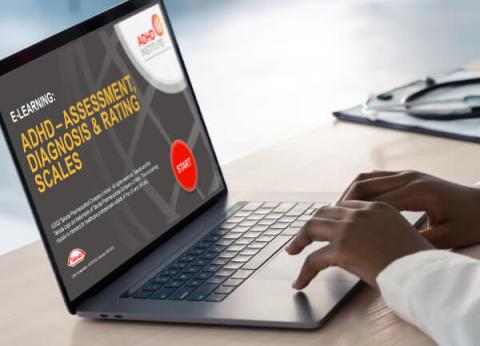ADHD assessment involves clinical examination, interviews and rating scales. Formal ADHD diagnosis typically utilises the DSM-5TM/DSM-5-TRTM or ICD-11 classification systems
The information presented here is not intended to guide the assessment or diagnosis of ADHD.
Attention-deficit hyperactivity disorder (ADHD), or hyperkinetic disorder (HKD), can have a significant impact on individuals’ lives, and is generally considered to have three component features – inattention, hyperactivity and impulsivity – with the severity and combination of symptoms varying between individuals and across the lifespan.1 These factors, combined with the frequent presence of psychiatric comorbidities,2-7 make the assessment and diagnosis of ADHD challenging.
How is ADHD assessed?
The assessment process involves the comprehensive evaluation of information gathered from a number of sources, including: clinical examination; clinical interviews with individuals, and with parents/teachers for children and adolescents with ADHD or partners for adults with ADHD; and use of assessment tools and rating scales.2-6
How is ADHD diagnosed?
The National Institute for Health and Care Excellence (NICE) guidelines state that a diagnosis of ADHD should only be made by a specialist psychiatrist, paediatrician or other appropriately qualified healthcare professional with training and expertise in the diagnosis of ADHD. Furthermore, it should be based upon a full clinical and psychosocial assessment, a full developmental and psychiatric history, and observer reports of the individual’s mental state. For a diagnosis of ADHD, symptoms of hyperactivity-impulsivity and/or inattention should meet the diagnostic criteria in the Diagnostic and Statistical Manual of Mental Disorders – 5th Edition (DSM-5TM) for ADHD (recently updated in 2022 to DSM-5 – Text Revision [DSM-5-TRTM])1 and the International Statistical Classification of Diseases and Related Health Problems 10th Revision (ICD-10) for HKD.2 Note that in 2018 the ICD-10 was updated to the International Classification of Diseases 11th Revision (ICD-11), where HKD is now referred to as ADHD.8
UNDERSTANDING ADHD: NAVIGATING THE ASSESSMENT PROCESS
UNDERSTANDING ADHD: GETTING THE DIAGNOSIS RIGHT
Are rating scales used in the assessment of ADHD?
Rating scales are an essential part of the full assessment process for ADHD; they vary in format and scope, and recognise the need for multidisciplinary input on an individual’s condition and symptomatology.2-5
Date of preparation: July 2025; Job code: C-ANPROM/EUC/NBU/0003
Explore Assessment & Diagnosis



Register as a healthcare professional
Registration gives you the benefit of access to all pages and assets on the site as well as update e-mails and additional information from Takeda on new education materials and events.
Register
